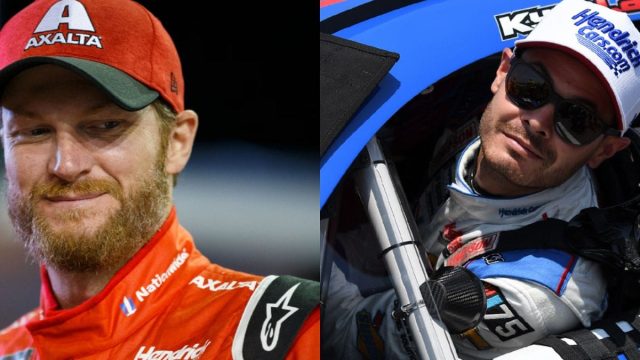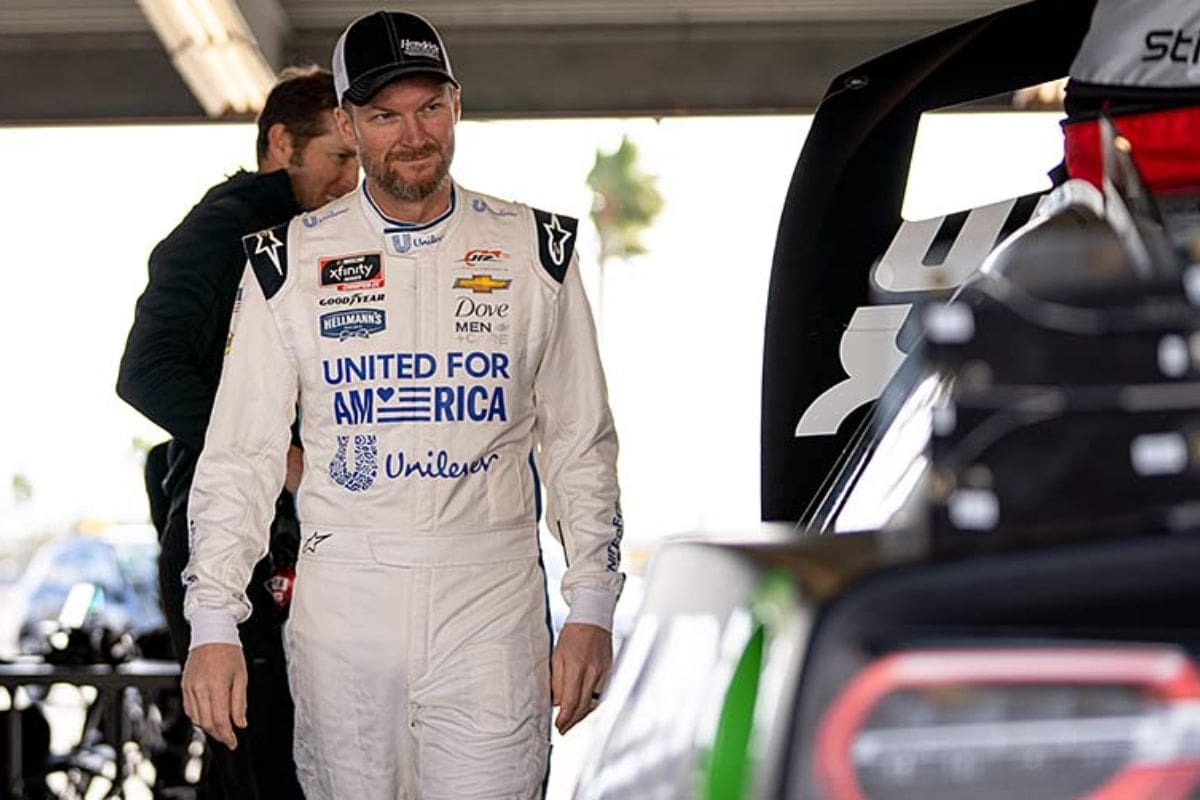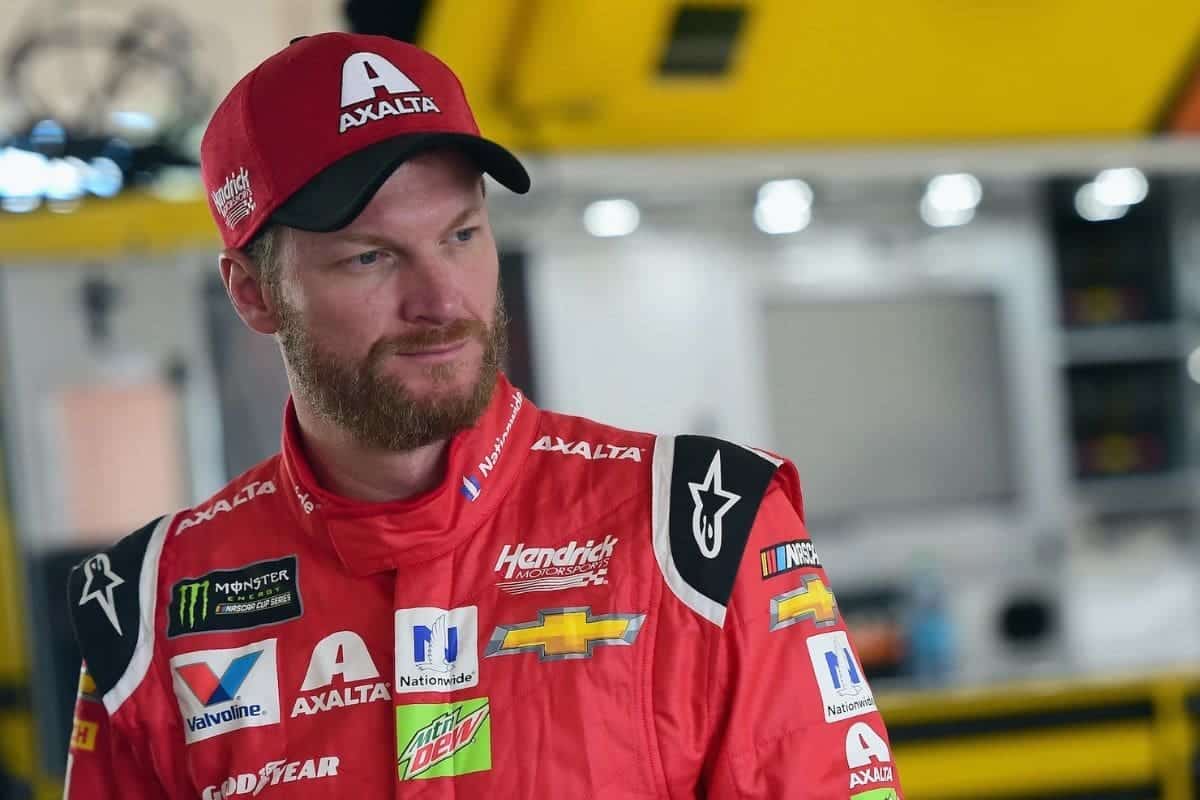Dale Jr. Slams Hendrick Fanboy Accusations: Dale Earnhardt Jr.‘s recent criticism to accusations of being a ‘Hendrick fanboy‘ sheds light on the web of loyalty and rivalry in NASCAR. His comments, particularly in relation to Kyle Larson‘s remarks during the Brickyard 400, challenge the simplistic narratives often ascribed to driver affiliations. By advocating for the significance of personal bonds over team loyalty, Earnhardt Jr. invites a deeper examination of the motivations that drive competitors in the sport. This raises intriguing questions about how friendships can influence race strategies and public perceptions, ultimately redefining the essence of competition in NASCAR.
Key Highlights
- Dale Earnhardt Jr. expressed his support for Kyle Larson, challenging the expectation of loyalty to Hendrick Motorsports during the Brickyard 400.
- Earnhardt Jr. defended his impartiality, rejecting the ‘Hendrick fanboy’ label in favor of valuing personal relationships over strict team allegiance.
- His comments highlighted the coexistence of rivalry and respect in NASCAR, advocating for a nuanced understanding of competition dynamics.
- Earnhardt Jr.’s remarks underscored the importance of fairness in motorsport commentary amid accusations of bias.
Dale Earnhardt Jr’s Support and Controversy
In the wake of the Brickyard 400, Dale Earnhardt Jr.’s unexpected endorsement of Kyle Larson amid the race’s controversial late restart has ignited a debate about loyalty and objectivity in the world of NASCAR commentary.
Earnhardt Jr. has been viewed through the lens of his longstanding affiliation with Hendrick Motorsports, creating an expectation that his commentary would reflect a bias towards the team he once drove for. However, his vocal support for Larson during a critical moment in the race has raised eyebrows and prompted discussions about the integrity of sports commentary.
Earnhardt Jr.’s endorsement came after a crucial tactical decision made by Brad Keselowski, who chose to pit just before the restart, unknowingly enabling Larson to gain an advantageous position. This situation not only altered the dynamics of the race but also exposed the precarious balancing act commentators perform between personal allegiances and professional objectivity.
Dale Jr. positions himself as a commentator willing to transcend traditional loyalties, yet this stance invites accusations of bias, particularly from fans who perceive his endorsement as a betrayal of his Hendrick roots.
The ensuing controversy highlights the complexities inherent in motorsport commentary, where personal connections can clash with the quest for impartial analysis. Dale Earnhardt Jr.’s comments challenge the notion of steadfast loyalty in NASCAR and provoke a broader examination of how commentators navigate their own biases while working to provide a detailed perspective on the sport.
Ryan Blaney’s Strategic Call and Controversy
The unfolding drama surrounding the Brickyard 400 not only spotlighted Dale Earnhardt Jr.’s controversial support for Kyle Larson but also brought Ryan Blaney’s deliberate tactical decisions into sharp focus, as his team opted for the outside lane in an effort to capitalize on potential pitfalls faced by their competitors. This essential call aimed to position Blaney favorably for a potential victory, particularly given the crucial situation with the No. 6 Ford’s fuel shortage.
Blaney’s choice appeared sound initially, as he sought to exploit the uncertainties of the race restart. However, the situation quickly became convoluted when Brad Keselowski, the RFK Racing driver, relinquished the front row to Larson.
The ensuing controversy was worsened by allegations that Larson had jumped the restart, igniting debates among fans and pundits about fairness and favoritism. The implications of these events not only affected Blaney’s chances but also drew inspections on Earnhardt Jr.’s position, despite his expressed desire for a Blaney victory.
- Tactical lane choices can determine race outcomes.
- Fuel management is a crucial component of race strategy.
- Restart regulations are often contentious and closely scrutinized.
- Fan perceptions can shape narratives around race fairness.
Dale Earnhardt Jr’s Support for Ryan Blaney
Dale Earnhardt Jr.’s heartfelt endorsement of Ryan Blaney during the Brickyard 400 highlights the complexities of loyalty and competition within the NASCAR community, as he navigated the fine line between supporting a friend and addressing allegations of favoritism. As a prominent figure in the sport, Earnhardt’s sentiments carry weight, particularly when he openly expressed his desire for Blaney to claim victory.
In a frank moment on his podcast, Earnhardt confronted the criticisms he faced, particularly the label of a ‘Hendrick fanboy,’ suggesting that his allegiance to the Hendrick Motorsports team might overshadow his support for Blaney.
“Listen, I wanted Blaney to win the race. I was hoping Ryan Blaney was gonna win at Indy. I got some buddies around me giving me sh*t that I’m a Hendrick fanboy and want Larson to win the race any Hendrick car, right? I was sitting there with 10 to go, hoping Ryan Blaney was going to win Brickyard 400. But it didn’t work out,”-(dale jr.)
Earnhardt’s position demonstrates a broader narrative in NASCAR, where personal relationships often intersect with competitive rivalries. His willingness to publicly support Blaney, despite external stress and accusations, indicates a profound respect for fellowship in racing—a value that transcends team affiliations.
This endorsement not only reinforces the importance of loyalty but also challenges the notion that fans and commentators must strictly align with one team or driver.
Earnhardt’s remarks serve as a reminder that, within the high-stakes environment of NASCAR, friendships and competition can coexist, building a community that values both rivalry and respect.
Dale Earnhardt Jr on NASCAR’s Decision
Amidst the swirling controversy over Kyle Larson’s restart during the Brickyard 400, Earnhardt Jr. openly stated his support for NASCAR’s decision to allow the race to continue without interference. He emphasized the need for swift judgment in high-pressure situations. He contended that race officials must act quickly and decisively, especially when faced with the dynamic nature of racing events.
“So, the way it unfolded is the way it did, and naturally it looked fine. We’ll go back and just see if there’s anything we would have done different,” -(nascar vp)
Earnhardt Jr. noted that the chaotic environment of a late-race restart often leaves little room for deliberation. NASCAR’s choice to refrain from intervening was both justified and necessary. He acknowledged the validity of fans’ frustrations but stressed that the circumstances did not warrant official intervention.
Key points supporting Earnhardt Jr.’s stance include:
- Immediate Response: The fast-paced nature of racing necessitates quick decisions from officials.
- Driver Accountability: Each driver must navigate restarts with a sense of responsibility for their actions.
- Maintaining Race Flow: Interrupting the race could disrupt momentum and the competitive spirit.
- Consistency in Judgment: NASCAR must apply its rules uniformly to uphold integrity.
Earnhardt Jr.’s endorsement of NASCAR’s decision reflects a deeper understanding of the complexities inherent in race management. He advocates for a balanced approach that prioritizes both competition and fairness.
NASCAR’s Consistent Approach to Restart Controversies
NASCAR’s handling of restart controversies reflects a deliberate tactic aimed at maintaining race continuity and minimizing the potential for further complications during critical moments. This approach highlights a commitment to allowing races to unfold organically, as illustrated during the recent Brickyard 400 and earlier incidents, such as the Richmond race. By refraining from intervening in situations where drivers may breach restart protocols, NASCAR seeks to avoid introducing extra variables that could complicate the race dynamics.
“That was right on top of the restart zone. I think if you waived it off, you could also have the potential of an accordion effect or some mistake happening by a driver not getting that information and having some damage created by some contact midfield … So if I’m personally in the booth in that moment, I would fear that and say, Let’s just let this happen.”-(dale jr.)
Dale Earnhardt Jr.’s insights on the matter emphasize the inherent risks involved in pausing a restart. He articulated concerns about the potential for an ‘accordion effect,’ where a sudden stoppage could lead to miscommunication among drivers and result in unintended collisions. This perspective aligns with NASCAR’s historical tendency to prioritize the flow of the race over the rigid enforcement of restart rules, aiming to preserve the integrity of competition while minimizing further disputes.
The consistency in NASCAR’s approach suggests a broader philosophy: maintaining a balance between regulation and the organic nature of racing. By allowing incidents to play out, NASCAR not only reduces the immediate fallout but also builds a competitive environment that rewards drivers’ decisions in real-time.
As fans and stakeholders analyze these decisions, it becomes clear that NASCAR is traversing a complex landscape where the preservation of race integrity often supersedes strict adherence to procedural enforcement.
News in Brief: Dale Jr. Slams Hendrick Fanboy Accusations
In maneuvering the complexities of loyalty and rivalry within NASCAR, Dale Earnhardt Jr.’s responses to the ‘Hendrick fanboy‘ allegations reveal a deeper understanding of interpersonal dynamics among competitors.
By prioritizing friendship and support over rigid team affiliations, Earnhardt Jr. advocates for a more refined perspective on the sport’s relationships.
This approach not only challenges traditional narratives but also fosters a culture of respect and fellowship, ultimately enriching the competitive landscape of NASCAR.
ALSO READ: Dale Earnhardt Jr. Slams NASCAR Drivers for Premature Belt Undoing



